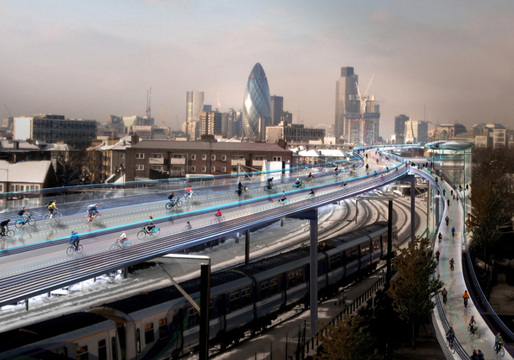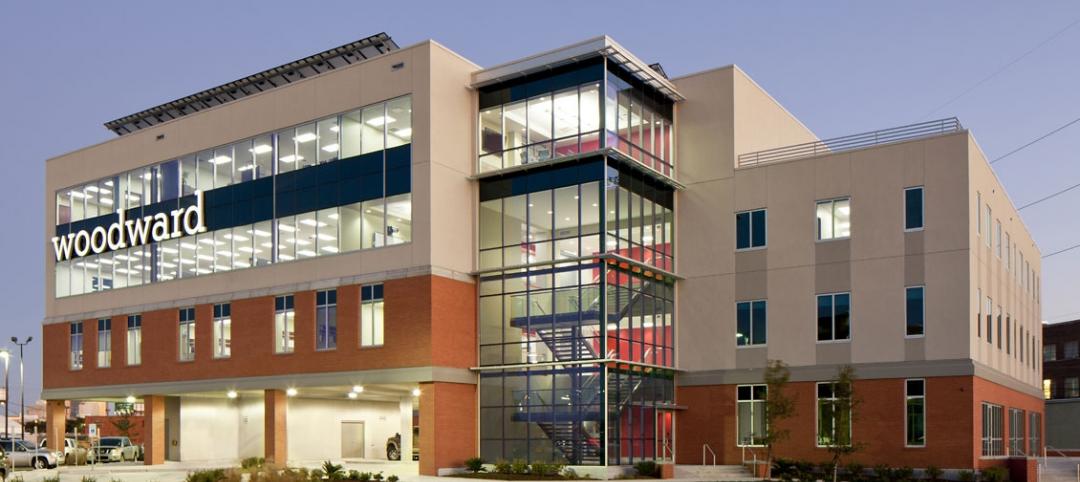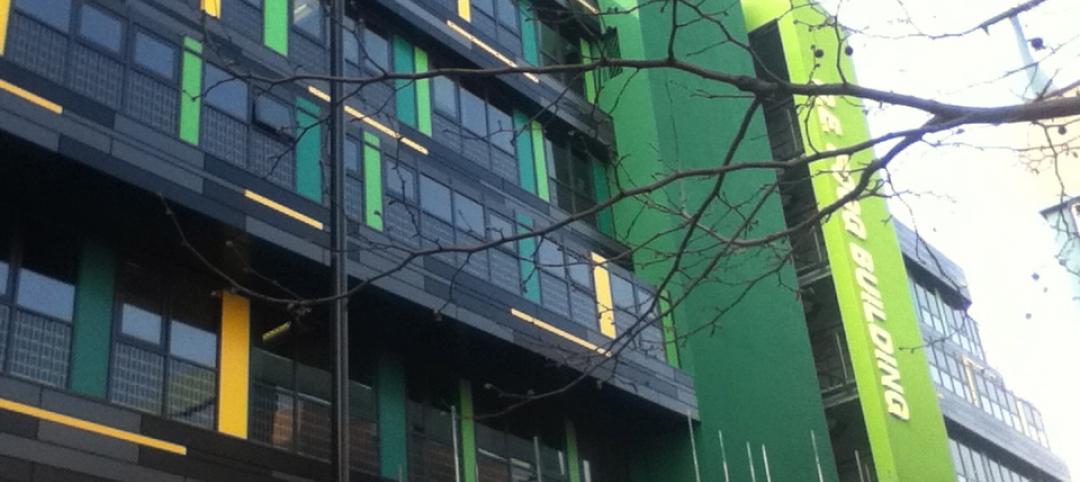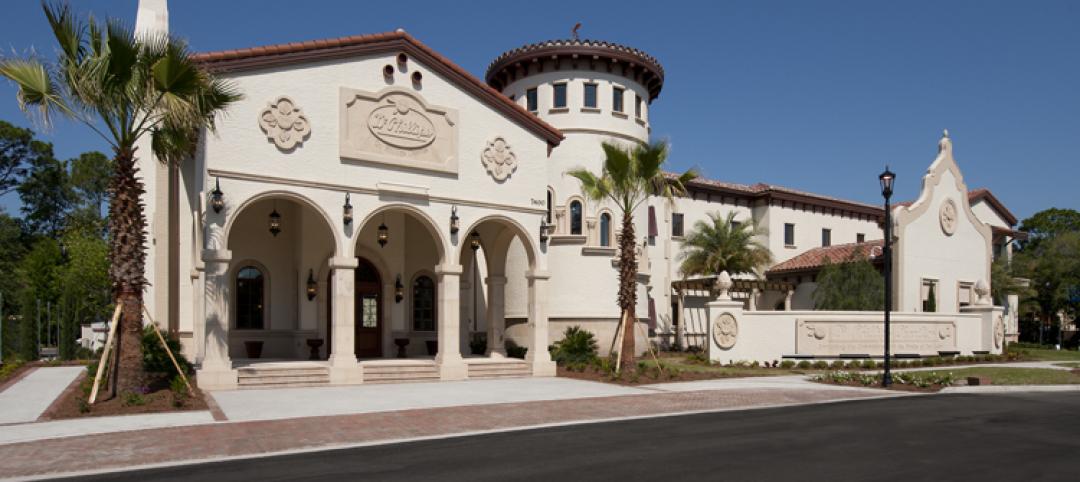Exterior Architecture, Foster + Partners and Space Syntax—a team who share Lord Foster’s passion for the benefits of cycling—have jointly developed SkyCycle, a new approach to transform cycling in the capital. Following existing suburban railway corridors, a wide, secure deck would be constructed above the trains to create new cycle routes throughout London.
The proposed SkyCycle network follows existing suburban rail services and provides over 220 kilometres of safe, car free cycle routes which can be accessed at over 200 entrance points. Almost six million people live within the catchment area of the proposed network, half of whom live and work within 10 minutes of an entrance. Each route can accommodate 12,000 cyclists per hour and will improve journey times by up to 29 minutes.
The Mayor’s aim is for London to be the best major city in the world. However, the capital’s transport network is at capacity and faces the challenge of population growth of 12 percent over the next decade. The government has committed to investment in transport, through airport planning, high-speed rail, Thameslink and Crossrail. The Mayor’s transport strategy also seeks to address the needs of pedestrians and cyclists in the city’s crowded streets and in areas where the public realm is poor.
The environmental and health benefits of cycling notwithstanding, the bicycle is a more efficient use of London’s limited space – we believe there is a pressing need for network modelling of new capacity for these active, self-determined modes of transport.
The SkyCycle approach is revolutionary, and has potential applications in cities around the world. Applying lateral thinking, Britain’s engineering expertise and investment in transport technology could lead to the creation of an efficient platform building system.
As London’s railway lines were originally built for steam trains, they follow contours that naturally reduce the amount of energy expended and avoid steep gradients. SkyCycle exploits this historic legacy. Associated benefits include the regeneration of the typically low value, often underutilised industrial sites next to railway lines; vertically layering the city to create new social spaces and amenities on these cycling high streets; and the integration of automated goods delivery networks.
Early studies of a SkyCycle system indicate that it provides capacity at a much lower cost than building new roads and tunnels. The possibility of the deck providing development opportunities for businesses along the route, particularly where it intersects with stations and bridges, has also been the subject of the study, exploring ideas for public/private commercial growth and regeneration.
The SkyCycle study team will continue to further develop these scenarios, and the project has already been presented to the GLA, TfL and Network Rail, as well as to developers and contractors with specialist rail experience.
Lord Foster stated: "Cycling is one of my great passions – particularly with a group of friends. And I believe that cities where you can walk or cycle, rather than drive, are more congenial places in which to live. To improve the quality of life for all in London and to encourage a new generation of cyclists, we have to make it safe. However, the greatest barrier to segregating cars and cyclists is the physical constraint of London’s streets, where space is already at a premium. SkyCycle is a lateral approach to finding space in a congested city. By using the corridors above the suburban railways, we could create a world-class network of safe, car free cycle routes that are ideally located for commuters."
Sam Martin & Oli Clark of Exterior Architecture Ltd: "SkyCycle is an urban cycling solution for London. A cycling utopia, with no buses, no cars and no stress. We are incredibly excited at how together with Foster + Partners our idea has been developed and now more recently turned into a truly world changing scenario by Space Syntax for revolutionising cycling in London and possibly the world."
Anna Rose, Space Syntax: "Space Syntax is delighted to be developing the SkyCycle concept with Exterior Architecture and Foster + Partners. At crucial points in London’s history major infrastructure projects have transformed the fortunes of the Capital: for example, Bazalgette’s sewer system helped remove the threat of cholera to keep London at the forefront of the industrial revolution; the Underground strengthened London’s core by making long-distance commuting possible. SkyCycle is conceived in this tradition as a network of strategic connections from the suburban edges to the centre, adding the much needed capacity for hundreds of millions of cycle journeys every year with all the social, economic, environmental and health benefits to London that follow. Space Syntax is evaluating these impacts, using a new generation of transport model to analyse cycle movement."
A spokesman for Network Rail said: "We welcome the proposals which have been put forward by Foster + Partners and Exterior Architecture and are always happy to look at ways we can contribute to improving travel and transport in London. We will continue to liaise with all involved as the aspiration for this innovative scheme develops."
Related Stories
| Dec 6, 2011
Mortenson Construction completes Elk Wind Project in Iowa
By the end of 2011, Mortenson will have built 17 wind projects in the state generating a total of 1894 megawatts of renewable power.
| Dec 6, 2011
?ThyssenKrupp acquires Sterling Elevators Services
The acquisition of Sterling Elevator Services Corporation is the third acquisition completed by ThyssenKrupp Elevator AG in the last three months in North America.
| Dec 6, 2011
Vivenzio named vice president of building performance practice at Thornton Tomasetti’s New York Office
Vivenzio, a licensed architect in New York and New Jersey, has more than 28 years of experience in architectural project management, construction administration, building diagnostic services and forensic investigation.
| Dec 6, 2011
New office building features largest solar panel system in New Orleans
Woodward Design+Build celebrates grand opening of new green headquarters in Central City.
| Dec 5, 2011
New York and San Francisco receive World Green Building Council's Government Leadership Awards
USGBC commends two U.S. cities for their innovation in green building leadership.
| Dec 5, 2011
Summit Design+Build begins renovation of Chicago’s Esquire Theatre
The 33,000 square foot building will undergo an extensive structural remodel and core & shell build-out changing the building’s use from a movie theater to a high-end retail center.
| Dec 5, 2011
Fraser Brown MacKenna wins Green Gown Award
Working closely with staff at Queen Mary University of London, MEP Engineers Mott MacDonald, Cost Consultants Burnley Wilson Fish and main contractor Charter Construction, we developed a three-fold solution for the sustainable retrofit of the building.
| Dec 5, 2011
RJM Construction begins building Nova Classical Academy in St. Paul
As the general contractor, RJM is constructing the 94,000-sf building that will consolidate the St. Paul school’s two other locations.
| Dec 5, 2011
Gables Residential brings mixed-use building to Houston's Tanglewood area
The design integrates a detailed brick and masonry facade, acknowledging the soft pastel color palette of the surrounding Mediterranean heritage of Tanglewood.
| Dec 5, 2011
SchenkelShultz Architecture designs Dr. Phillips Charities Headquarters building in Orlando
The building incorporates sustainable architectural features, environmentally friendly building products, energy-efficient systems, and environmentally-sensitive construction practices.

















